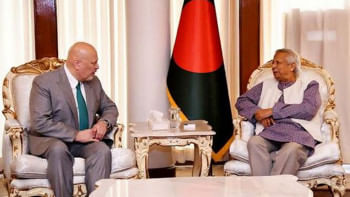Rough ride for Najib Razak

Malaysian Prime Minister Najib Razak is passing a difficult time, amid allegations of a financial scam. In early July, the Wall Street Journal (WSJ) carried reports that $700 million was transferred through a complex web of transactions to Najib's bank accounts in Kuala Lumpur in 2013. Graphic details of the flow of millions of Ringgit through banks, companies and government agencies, linked to 1Malaysia Development Berhad (1MDB), to Najib's private account also came to light.
Neither the source of the money nor its final destination is clear. Handsome amounts from Najib's accounts went to "Barisan Nasional" (BN) coalition component parties. Apparently, the funds were used for election campaign in 2013.
1MDB is a Malaysian government-owned development company. It was established in January 2009, to drive strategic initiatives for long term economic development of the country through global partnership and promoting foreign direct investment. 1MDB focuses on the areas of energy, real estate, tourism and agribusiness. Prime Minister Najib Razak chairs the advisory board of 1MDB.
In 2009, 1MDB and PetroSaudi International Limited set up a $2.5 billion joint venture to facilitate the flow of FDIs from Middle East to Malaysia. According to reports, this joint venture was involved in the financial scam, helped by some middlemen close to Najib.
Allegations of financial mismanagement regarding 1MDB's operations kept mounting over the years, particularly from opposition parties. Its credential and transparency were frequently questioned by the media, as its accumulated debt rose to over $11 billion. There were allegations that 1MDB overpriced its purchases and donated the money to Najib's foundation.
In early March 2015, the government set up a Joint Task Force to probe the alleged mismanagement of funds in 1MDB. A second Special Task Force (STF) was constituted in July to investigate the allegations against Prime Minister Najib. The members include the Attorney-General, Central Bank Governor, Police Chief and Anti-Corruption Commission. STF members have been drawn from different departments, so that it cannot be influenced.
When these stories appeared in local and international media, the reaction from Prime Minister Najib was to deny that any such fund was transferred to his accounts. "Accusations by the WSJ are malicious and supported by certain quarters in the country with the purpose of forcing me to quit as prime minister and president of the UMNO (United Malays National Organisation)," said the embattled Prime Minister.
Indeed, the federal political culture in Malaysia largely revolves around UMNO. Najib Razak's UMNO is the largest component of Barisan Nasional (BN), a coalition of 13 parties, and had been in power since Malaysia's independence from Britain in 1957.
The Special Task Force has been sniffing around for clues surrounding the sudden swelling of funds in Najib's personal accounts. Bank accounts have been blocked, 1MDB office has been raided and several arrests have been made so far.
To keep the situation under control, Najib Razak in a drastic move on July 28, sacked his deputy Muhyiddin Yassin and replaced Attorney General Abdul Gani Patail. Muhyiddin had asked Najib to give up the 1MDB chairmanship and was quite vocal about Najib's handling of the allegations. Najib also elevated close ally Home Minister Ahmed Zahid Hamidi as his deputy prime minister and replaced four other ministers. Gani, who was heading the investigation, had probably stepped on something incriminating. He was apparently preparing a charge sheet against Najib.
Though the new cabinet has stood by Najib's ordeal, there are speculations of restlessness in UMNO.
In another move to stifle the media, the Home Ministry suspended two newspapers - The Edge Financial Daily and The Edge Weekly - for reporting on the scandal, as the ministry deemed its reports "prejudicial to public order".
Najib Razak's probable nemesis lies within his party. His greatest threat is former Prime Minister Dr. Mahathir Mohamad, still widely respected as the architect of modern Malaysia. Mahathir, who carries considerable weight within UMNO, called upon Najib to prove his innocence by letting the Task Force look into his accounts or else resign. Mahathir's next move will be interesting to watch.
The opposition alliance has been making loud noises. Azizah Ismail asked Najib to go on a leave so that the investigation can proceed without any hindrance. She however failed to capitalise on Najib's vulnerability as they are in disarray. The loose opposition alliance is split into several factions.
In an interesting twist to the ghastly episode, the Malaysian Anti-Corruption Commission (MACC) on August 3 confirmed that the huge amount of money in Najib Razak's account came from "donors" and not from 1MDB. It did not disclose the identities of the donors or the purpose of the contribution. Neither did it say how the money was spent. MACC said it was referring the matter to the central bank and police. MACC stopped looking into Najib's bank accounts; instead, it is now looking into one of the subsidiaries of 1MDB. MACC's statement also said that there was no draft charge sheet prepared against Najib.
Though this news may give some relief to Najib, it smacks of manipulation and intimidation. The dismissal of top officials earlier was a clear enough warning to the MACC. Najib Razak has apparently made arrangements to delay the findings of the Task Force and eventually clear his name.
There is a maxim in bureaucracy—"Do not setup an investigation, unless you know the results of the findings well in advance." It would be naïve to think that Najib does not know the findings of the Task Force.
Whatever may be the ultimate findings of the Task Force, the fact that huge amounts of money were transferred to Najib's accounts has been established.
It looks like Najib will probably ride through this crisis. But his moral authority and credibility have been badly dented.
The writer is former Ambassador and Secretary.


 For all latest news, follow The Daily Star's Google News channel.
For all latest news, follow The Daily Star's Google News channel. 



Comments